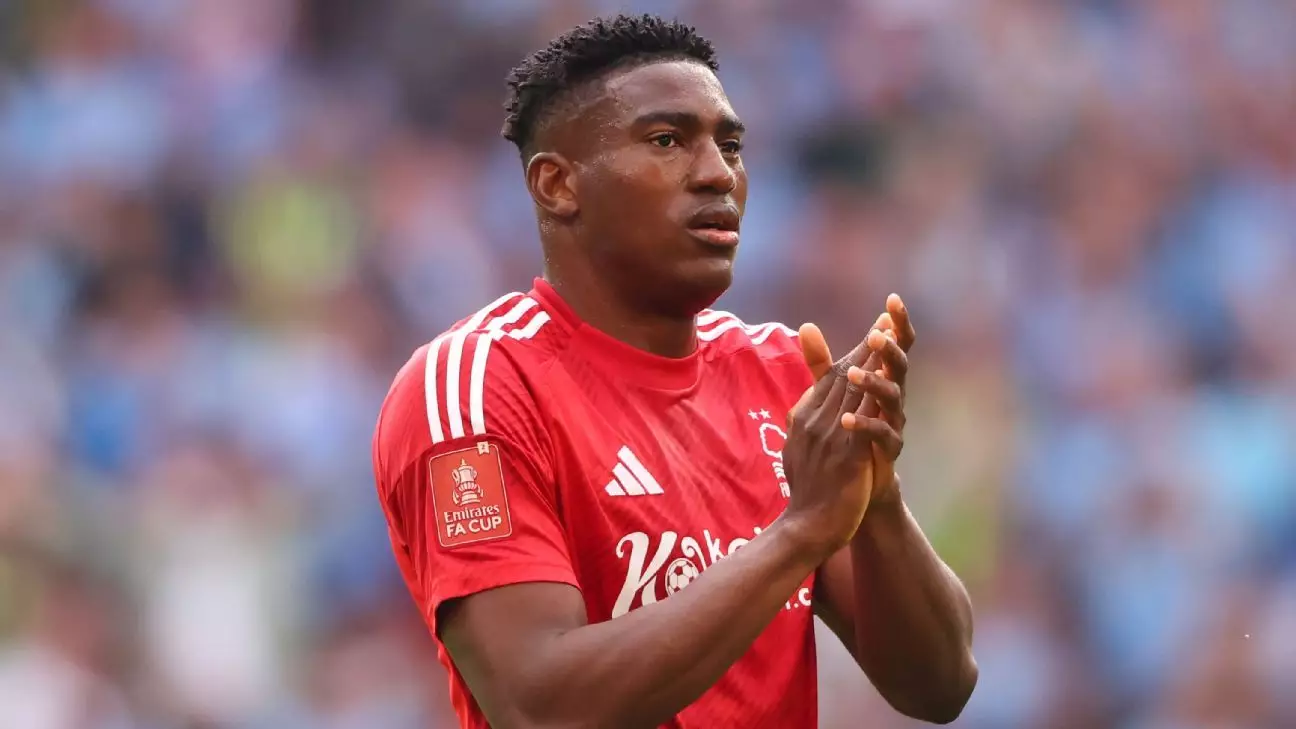In the realm of sports, injury is a looming specter that haunts athletes, often emerging unexpectedly and with devastating consequences. A tragic exemplification of this reality unfolded during a recent Premier League match involving Nottingham Forest and Leicester City, where Taiwo Awoniyi, the celebrated Nigerian striker, faced a harrowing ordeal. Coming on as a substitute in the second half, Awoniyi collided with the goal frame, suffering a severe abdominal injury that required urgent surgery. Such incidents serve as a stark reminder of the physical toll that professional athletics can impose on individuals who are often viewed through the lens of mere performance statistics.
Awoniyi’s immediate response post-injury was indicative of a warrior spirit; he signaled that he was ready to continue play despite evident discomfort. This moment speaks volumes about the mentality athletes develop—a mixture of dedication and bravado that can sometimes cloud their judgment regarding their own health. The management team’s decision to keep him on the field heightened the stakes, as they unwittingly jeopardized not just Awoniyi’s health, but the overall performance of the Forest squad. Observers of the game were left to wonder: at what point does the pursuit of victory overshadow the pressing needs of player welfare?
Management Miscommunication and Its Shockwaves
The incident spiraled into a significant management dispute as Forest’s owner, Evangelos Marinakis, engaged in a high-profile confrontation with manager Nuno Espirito Santo. It became apparent that a miscommunication between the bench and medical staff contributed to the dire situation. Such a lapse is alarming, especially for an organization striving for recognition in the highly competitive Premier League. This episode serves as a glaring example of the necessity for clear lines of communication—particularly regarding player health.
Espirito Santo’s decision to leave Awoniyi in the game, despite his discomfort, ignited passionate debate among fans and analysts alike. Should victory be prioritized over the well-being of players? The cohesive link between management, medical staff, and players is crucial; when broken, it can have severe repercussions—both statistically, in terms of match performance, and morally, concerning the treatment of athletes. The Bundesliga, La Liga, and Serie A have all established protocols aiming to minimize such risks, demonstrating a growing recognition of player welfare as an integral part of football management strategies.
The Road to Recovery: An Induced Coma
Fast forward to the aftermath of the injury: Awoniyi’s road to recovery included being placed in an induced coma due to complications following surgery. This step was taken to aid healing by regulating his movement and heart rate, underscoring the seriousness of the situation. While the club announced that he was “recovering well,” there’s an inherent fragility present in such moments—the life of a professional athlete can hang in the balance due to split-second decisions made on the pitch.
This unsettling period highlights the pressing ethical dilemma within professional sports—how to balance the primal intensity of competition with the irrefutable need for compassion and safety. The emotional toll on both players and the management cannot be overstated; amid the fervor of competition, humans possess an intrinsic wish to protect one another, as evidenced by Marinakis’ on-field intervention. This incident was not merely about football but encapsulated a wider societal struggle regarding how we value life and well-being against the backdrop of glorified athletic achievement.
The Unfolding Narrative of Nottingham Forest
As Nottingham Forest grapples with the implications of Awoniyi’s injury, there is an air of urgency surrounding their quest for Champions League qualification. With only two games remaining in the season, the team finds itself in a precarious position; success on the pitch may now come at a heavy moral and ethical cost. The pressure to perform amid adversity can often bring out the best and worst in teams, as mental fortitude becomes a necessary component of success.
Marinakis’ emotional investment in the team is both admirable and revealing. His instinctive decision to confront the manager over Awoniyi’s plight illustrates a raw, human connection to the sport that transcends mere business interests. Nevertheless, the complexities of ownership rules, especially given Marinakis’ dual role with Olympiakos, further complicate an already tumultuous situation for Nottingham Forest. The world of football is never purely about soccer; it is a rich tapestry woven from deeply personal stakes and myriad influences that frequently intersect.
Awoniyi’s experience, a singular moment of peril within the larger context of a football season, crystallizes the urgent conversation surrounding player welfare, communication in management, and the delicate interplay of passion, business, and human dignity in sports.

